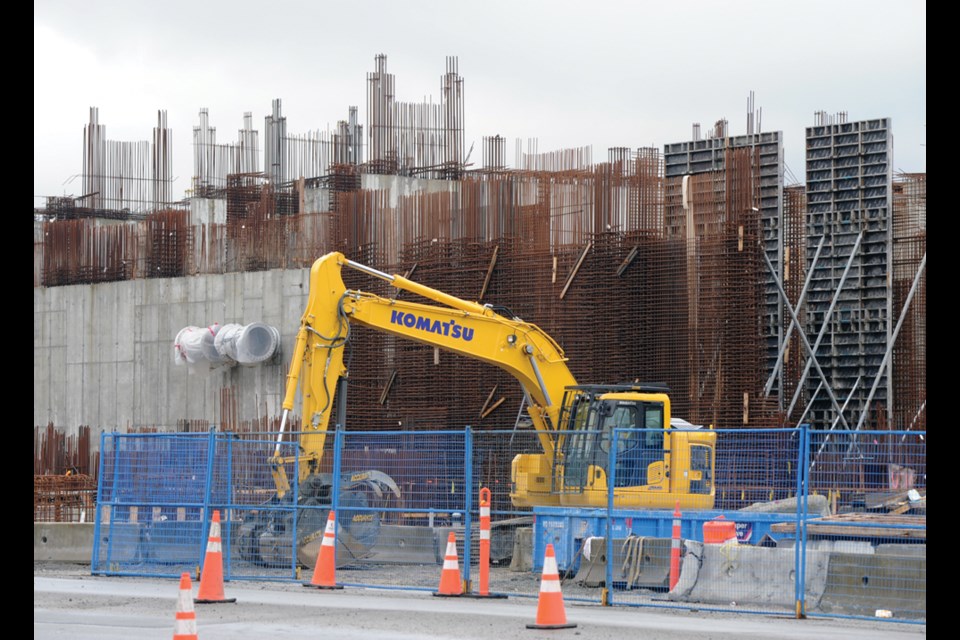The company originally contracted to build the North Shore’s massive new sewage plant has filed a multimillion-dollar lawsuit against Metro Vancouver, alleging its contract with the regional government was wrongfully terminated.
In a lawsuit filed in B.C. Supreme Court Thursday (March 31), Acciona is seeking more than $250 million for unpaid costs related to the project, as well as lost profits and lost opportunity as a result of “diminished reputation” caused by Metro ending its contract.
In the 98-page document, Acciona alleges the design of the project was subject to numerous significant changes by Metro, and that it was not physically possible to build the project Metro wanted on the site selected.
Metro delayed approving changes, Acciona alleges
The company alleges it was Metro’s delay of or withholding of approvals on necessary changes that resulted in delays to the project. Serious soil conditions on the site that resulted in increased costs and delays also weren’t known until after the company signed the project agreement, the company alleges.
Acciona was selected by Metro to design and build the new North Shore Wastewater Treatment plan serving North and West Vancouver in April 2017 for a contract price of just over $504 million.
But the project soon ran into trouble, with Acciona concluding it wasn’t possible to build the plant Metro had specified on the site it had selected without “numerous and significant changes,” according to the lawsuit.
By 2020, the regional government and the company had agreed to changes and amended the price of the project to over $621 million, as well as setting a new target date for completion of September 2023.
By mid-2021, however, it was clear it would still be impossible to meet those deadlines without “further significant changes” to the project, Acciona alleges.
Metro, however, refused to agree to further changes, including those needed to address “numerous conflicts and errors” in Metro’s specifications, according to the lawsuit.
The government “interfered extensively with Acciona’s performance” by consistently refusing to review and approve changes to the plant’s design in a timely way, according to the company.
Metro will defend itself in court, says Dobrovolny
In response to the lawsuit, Jerry Dobrovolny, Metro Vancouver’s chief administrative officer, issued a statement saying the regional government will defend itself against Acciona’s claims, “including the unfounded allegations of misconduct.”
“Metro Vancouver is confident that its decision to terminate [the contract] was justified,” Dobrovolny added.
“Metro Vancouver continued to act reasonably and uphold the terms of the contract, including making all payments due in a timely fashion. However, Acciona Wastewater Solutions LP missed key construction milestones,” said Dobrovolny.
Dobrovolny said it became apparent in 2021 that Acciona would be “unable to meet its obligations under its contract with Metro Vancouver, including completing the design and construction of the North Shore Wastewater Treatment Plant by the key dates they committed to in the contract. They also asked for a further increase in budget which would almost double the original contract price.”
Metro terminated the contract in January 2022, and Acciona finished withdrawing from the site on McKeen Avenue in the past month.
In February, Metro Vancouver hired a new contractor, PCL Constructors Westcoast Inc., at a cost of $40 million, to develop a new plan to complete the project, including a revised project budget and schedule. That isn’t expected to be completed until this fall.
Numerous problems discovered after contract signed - Acciona
In its lawsuit, Acciona has alleged there were numerous problems discovered after it signed the project agreement.
Among those was a discovery of more severe risk of liquefaction of soils on the site, resulting in the need to double the amount of reinforcing steel for major structures. That meant, however, that all of the equipment required for the plant would no longer fit into the buildings on the site, the lawsuit alleges.
Acciona stated in its lawsuit that Metro chose the former BC Rail site for the plant despite its space constraints.
At just under three hectares, “it is significantly smaller than sites usually selected for projects of a comparable scale,” the company states in its lawsuit.
Treatment plans changed from secondary to tertiary
Metro also changed the technology going into the treatment plant partway through, from secondary to tertiary treatment, requiring more space.
The company also discovered hazardous soils on the site, containing petroleum hydrocarbon and chloride ions that had not been disclosed, the lawsuit alleges.
In a statement, Acciona stated that Metro’s own administration of the project “was a major cause of most of the problems, and changing contractors mid-project will cost taxpayers more, and take longer to complete the project.”
The company added, Acciona had been forced to turn to the courts to “recover the payments clearly owing to it, and to protect its interests.”




